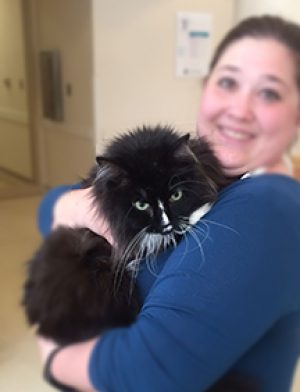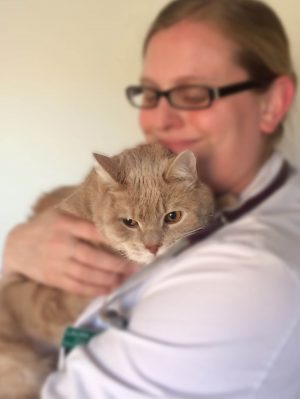A team of investigators at the College of Veterinary Medicine at MSU has found that mesenchymal stem cells may offer a novel approach to the treatment of inflammatory disorders in humans—as well as cats.

In the past, much of the animal research necessary to advance human immunology has focused on mice, which often results in fewer transfers from basic discovery to successful clinical application. Now, a team of scientists at MSU has determined that the immunomodulation function in humans is more similar to that in felines than in mice. This new finding means that relevant model systems can be used, which may increase successful clinical applications.
Drs. Maciej Parys, John Kruger, and Vilma Yuzbasiyan-Gurkan(1) have characterized the expression of genes known to be involved in MSC-based immunomodulation, or the regulating of an immune response. These findings re-contextualize MSC stem cells, and open new doors for research, Yuzbasiyan-Gurkan says. “Until recently, we thought these cells were for structure [bone, cartilage, muscle, and fat]. Now, we know they also function as immune modulators.”

The team is using this discovery to focus on developing new therapies for inflammatory disorders. Cats spontaneously develop a wide variety of these disorders, and may potentially benefit from mesenchymal stem cell (MSC)-based therapies. Chronic inflammatory disorders that may be amenable to stem cell-based therapy include asthma, inflammatory bowel disease, idiopathic/interstitial cystitis, chronic kidney disease, peridontititis/stomatitis, osteoarthritis, and dermatitis.
In another study published recently, this team of investigators showed that mesenchymal stem cells could be safely delivered to cats intraperitoneally(2).
“This work shows that cats are an important translational species for evaluating MSC-based therapies for diseases that also are common in humans,” Kruger says.

Dr. Parys, who is now at the University of Edinburgh, was awarded an AVMA/AVMF Young Investigator Award for this work in 2016 as a PhD student in the Comparative Medicine and Integrative Biology Program at the MSU College of Veterinary Medicine. “We have shown that in felines, as in humans, these cells are sending important messages to the immune system,” Parys says. “This makes felines better models for this type of immunomodulation research than mice, when considering therapy-based approaches for humans.”
1) Parys, M., Kruger, J.M., Yuzbasiyan-Gurkan, V. Evaluation of immunomodulatory properties of feline mesenchymal stem cells. Stem Cells Dev. 2017 Feb 9. doi: 10.1089/scd.2016.0041 https://www.ncbi.nlm.nih.gov/pubmed/28181858
2) Parys, M. Nelson, N., Koehl, K., Miller, R., Kaneene, J.B., Kruger, J.M., Yuzbasiyan-Gurkan, V. Safety of Intraperitonealitoneal Injection of Adipose Tissue-Derived Autologous Mesenchymal Stem Cells in Cat.s JVIM 2015 Octoberber 29. http://onlinelibrary.wiley.com... (DOI: 10.1111/jvim.13655)
